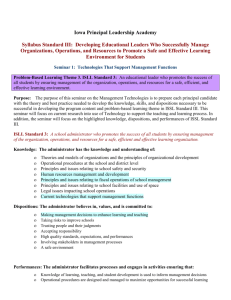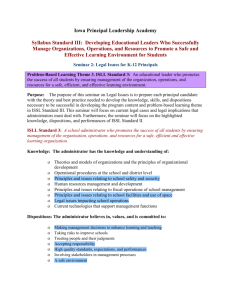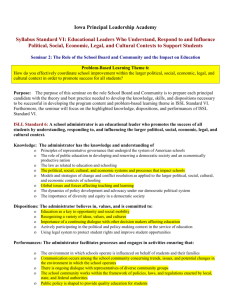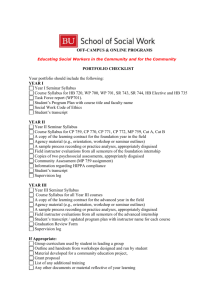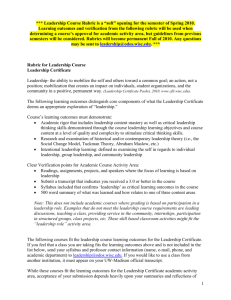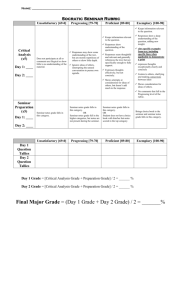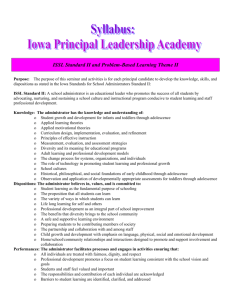Seminar 3 Syllabus - Prairie Lakes Area Education Agency
advertisement
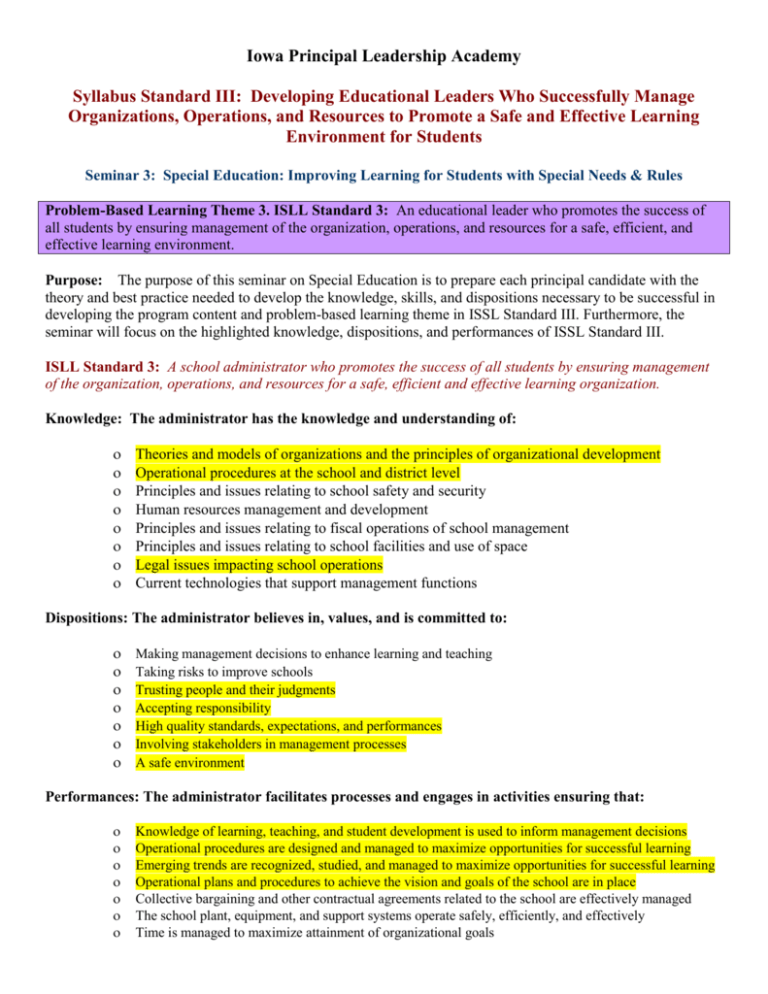
Iowa Principal Leadership Academy Syllabus Standard III: Developing Educational Leaders Who Successfully Manage Organizations, Operations, and Resources to Promote a Safe and Effective Learning Environment for Students Seminar 3: Special Education: Improving Learning for Students with Special Needs & Rules Problem-Based Learning Theme 3. ISLL Standard 3: An educational leader who promotes the success of all students by ensuring management of the organization, operations, and resources for a safe, efficient, and effective learning environment. Purpose: The purpose of this seminar on Special Education is to prepare each principal candidate with the theory and best practice needed to develop the knowledge, skills, and dispositions necessary to be successful in developing the program content and problem-based learning theme in ISSL Standard III. Furthermore, the seminar will focus on the highlighted knowledge, dispositions, and performances of ISSL Standard III. ISLL Standard 3: A school administrator who promotes the success of all students by ensuring management of the organization, operations, and resources for a safe, efficient and effective learning organization. Knowledge: The administrator has the knowledge and understanding of: Theories and models of organizations and the principles of organizational development Operational procedures at the school and district level Principles and issues relating to school safety and security Human resources management and development Principles and issues relating to fiscal operations of school management Principles and issues relating to school facilities and use of space Legal issues impacting school operations Current technologies that support management functions Dispositions: The administrator believes in, values, and is committed to: Making management decisions to enhance learning and teaching Taking risks to improve schools Trusting people and their judgments Accepting responsibility High quality standards, expectations, and performances Involving stakeholders in management processes A safe environment Performances: The administrator facilitates processes and engages in activities ensuring that: Knowledge of learning, teaching, and student development is used to inform management decisions Operational procedures are designed and managed to maximize opportunities for successful learning Emerging trends are recognized, studied, and managed to maximize opportunities for successful learning Operational plans and procedures to achieve the vision and goals of the school are in place Collective bargaining and other contractual agreements related to the school are effectively managed The school plant, equipment, and support systems operate safely, efficiently, and effectively Time is managed to maximize attainment of organizational goals Potential problems and opportunities are identified Problems are confronted and resolved in a timely manner Financial, human, and material resources are aligned to the goals of schools The school acts entrepreneurial to support continuous improvement Organizational systems are regularly monitored and modified as needed Stakeholders are involved in decisions affecting schools Responsibility is shared to maximize ownership and accountability Effective problem-framing and problem-solving skills are used Effective conflict resolution skills are used Effective group-process and consensus building skills are used Effective communications skills are used There is effective use of technology to manage school operations efficiently, and effectively A safe, clean, and aesthetically pleasing school environment is created and maintained Human resource functions support the attainment of school goals Confidentiality and privacy of school records are maintained This seminar will also include theory that supports the understandings of Distributive Leadership Principles 1-5 and Design Principles 1-5. Distributive Leadership Principle 1: The purpose of leadership is the improvement of instructional practice and performance, regardless of role. Distributed Leadership Principle 2: Instructional improvement requires continuous learning. Distributed Leadership Principle 3: Learning requires modeling. Distributed Leadership Principle 4: The roles and activities of leadership flow from the expertise required for learning and improvement, not from the formal dictates of the institution. Distributed Leadership Principle 5: The exercise of authority requires reciprocity of accountability and capacity. Design Principle 1: Maintain a tight instructional focus over time. Design Principle 2: Routinize accountability for practice and performance in face-to-face relationships. Design Principle 3: Reduce isolation and open practice up to direct observation, analysis and criticism. Design Principle 4: Exercise differential treatment based on performance and capacity, not on volunteerism. Design Principle 5: Devolve increased discretion based on practice and performance. Endorsement 189 Content and Competencies: Content Standard 2: Knowledge and skill related to early childhood, elementary, early adolescent, and secondary level curriculum development. Content Standard 4: Knowledge of family support systems, factors which place families at risk, child care issues, and home-school community relationships and interactions designed to promote parent education, family involvement, and interagency collaboration. Content Standard 5: Knowledge of school law and legislative and public policy issues affecting children and families. Content Standard 7: Knowledge of current issues in special education administration Competency 3: Ensures management of the organization, operations, and resources for a safe, efficient, and effective learning environment. Tool Box Activities This Seminar Will Address: Overview of Tool Box Activities: Examine school operations and maintenance plan and decision-making process for meeting staff and student needs and requests. Journal findings. Examine building communications and district policies, practices and procedures. Are these aligned with best research and practice. Write a plan for improvement. Examine building emergency plans. Are they adequate? Journal findings. Review with building principal scheduling process. Determine how decisions are made. Journal findings. Review with building principal how human and material resources are utilized and decisions made for who does what and who gets what. Journal findings with suggestions for improvement. Review problem solving process used in your building, way(s) consensus is reached on building concerns, methods for making suggestions for improvements, etc. Is this aligned with research and best practice? Is it fair to all staff? Is the process effective? Journal findings. ________________________________________________________________________ BEFORE WEEKEND Review the course syllabus Review The Answer Book on Special Education Law – Third Edition, Susan Gorn (available from Prairie Lakes AEA) Review a district’s problem-solving methods for developing programming for students who are not successful in general curriculum and bring examples of child study or student assistance team procedures ________________________________________________________________________ Resources and Materials: Course Syllabus Council for Exceptional Children – Technology and Media Division: Consideration for Assistive Technology Quick Wheel (2002) Gorn: The Answer Book on Special Education Law – Third Edition (1999) Gorn: The Answer Book on Discipline (1999) Individuals with Disability Education Act (1999) Iowa Administrative Code: Chapter 41-Special Education (2000) More Strategies for Educating Everybody’s Children (ASCD) The Profession of School Administrator: An Analysis of the Responsibilities and Knowledge Areas Important for Beginning School Administrators (Tannenbaum) Tomlinson: Leadership for Differentiating Schools & Classrooms (2000) This is a problem-centered course: A problem is a troubled perplexed, trying situation…not an assigned task…It is indispensable to distinguish between genuine and mock problems. Does a question naturally suggest itself with some situation? Or is it an aloof thing, only for the purposes of conveying information? Would it arouse observation and engage experimentation outside of school? Or is it the teacher’s or textbook’s, made a problem for the pupil only because he cannot get the required mark unless he deals with it? (John Dewey, Democracy and Education, 1916) Special Education Overall Goal: The principal goal of Special Education is to provide the principal candidate with the background knowledge of situations they need to know in order to support the development of the knowledge, performances, and dispositions of ISSL Standards III and to support the development of each Problem-based Theme. Specific Seminar Goals: To identify current trends in educational strategies for students with disabilities To provide an overview of the Individuals with Disabilities Education Act (IDEA) and Iowa Special Education Regulations To compare best practices with the candidates’ local school district problem-solving approach methods for developing programming for students who are not successful in the general curriculum To understand the concepts of Free Appropriate Public Education (FAPE) and Least Restrictive Environment (LRE) in relation to providing special education services to students in public schools and components of student’s Individual Education Plan (IEP) To understand the procedural safeguards and due process requirements for students receiving special education, especially in the area of application of a district’s discipline policy Specific Seminar Continuing Objectives: To continue to dialogue with and receive Special Education support from the instructor as an expert mentor throughout Problem-based Learning Theme III in completing the action research, action plan, tool box activities, and reflective journaling. To develop specific course tool box journaling and action requirements through consultation with other Cohort Group members and the instructor as an expert mentor. Continue to critique the reference materials and sites and to share knowledge and understandings with cohort group, instructor, and other mentors. Student Assignments and Expectations: Listed in Syllabus 3: Problem-Based Learning Theme 3. Evaluation: Continuous Improve Continuum: Evaluation of the Organization Level 5 on the rubric is assigned for work of the highest academic quality. Level 4 on the rubric is assigned for professional quality work at the required quality level Level 3 on the rubric is assigned for adequate work, but not distinguished as sound quality at the proficient level. Those with a Level 3 Rubric will have the opportunity to revise and complete quality work. All work for the Iowa Principal Leadership Academy must be completed at Rubric Levels 4 or 5 to be considered proficient. All work must be completed at the proficient level.
